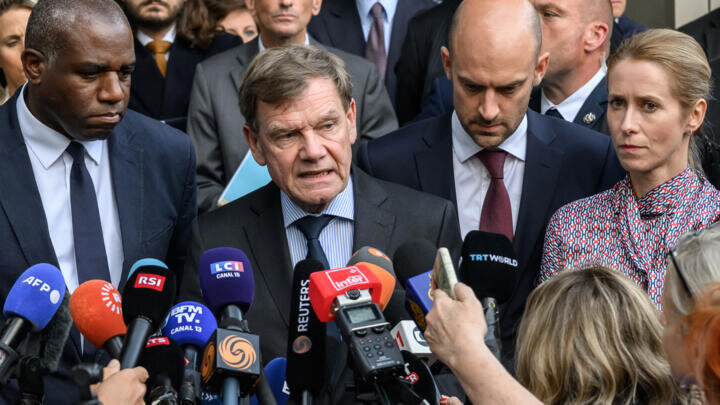Europe's coercive diplomacy seeks what Israel's war on Iran could not achieve

TEHRAN — As smoke still rises from the Israeli regime’s unprovoked aggression against Iran, European powers descended on Geneva Friday in a coordinated diplomatic push to extract from Tehran what their ally’s missiles failed to achieve.
In high-stakes talks with Iranian Foreign Minister Abbas Araghchi, the E3 (Britain, France, Germany) and EU foreign policy chief Kaja Kallas demanded Iran surrender its nuclear sovereignty under the guise of "diplomatic de-escalation" — all while refusing to condemn Israel’s ongoing bombardment of civilian and nuclear facilities.
The talks unfolded against a backdrop of unprovoked Israeli violence.
Just hours earlier, the regime struck the Arak heavy water reactor — a facility under comprehensive safeguards by the International Atomic Energy Agency (IAEA), and being built in accordance with the technical specifications agreed upon in the 2015 Joint Comprehensive Plan of Action (JCPOA).
Iran spent years negotiating the JCPOA with Europe and other countries—only for Europe, after Washington’s 2018 withdrawal, to prove unwilling or unable to uphold its commitments and counter the renewed anti-Iran sanctions, laying bare their hypocrisy.
Iran’s top diplomat Araghchi, addressing the UN Human Rights Council before his meeting with the Europeans, laid bare the West’s hypocrisy: "We were supposed to meet with the Americans on June 15 to craft a promising agreement. Israel’s attack on June 13 was a betrayal of diplomacy. It is obvious they don’t want a peaceful settlement."
His words laid bare a grim reality: either Israel deliberately torpedoed the sixth round of U.S.–Iran talks just days before they were due to start—exposing Western complicity—or, as many Iranians now believe, the entire negotiation was a sham, choreographed with Israel’s Western allies to mask preparations for aggression against Iran.
Europe’s bullying
French President Emmanuel Macron’s four-point "diplomatic solution," conveyed by Foreign Minister Jean-Noel Barrot, revealed the West’s true agenda:
I. Zero uranium enrichment on Iranian soil, reversing decades of established nuclear rights under the NPT.
II. Crippling restrictions on Iran’s defensive ballistic missile program.
III. Surveillance of regional alliances, framing Iran’s ties with its allies as "terrorist financing."
IV. Hostage-swap diplomacy, demanding Iran release Western spies while ignoring the violations and mistreatment of Iranian citizens.
British Foreign Secretary David Lammy, fresh from coordinating with U.S. Secretary of State Marco Rubio in Washington echoed the threats: "We were clear: Iran cannot have a nuclear weapon. There can be discussions about energy needs, but zero enrichment is the starting point."
This demand — a surrender of Iran’s inalienable rights under the NPT — was tellingly issued while Lammy admitted Israel "is doing well" in its war of aggression.
Araghchi’s remarks after the three-and-a-half-hour meeting with European envoys left no room for doubt. He made clear that Iran remains open to renewed diplomacy—“once the aggression is stopped and the aggressor is held accountable”—but refuses to engage while under fire.
He went on to insist that Iran’s defensive capabilities are off-limits. “Our defensive capabilities are non-negotiable,” he warned, stressing that any attempt to weaken Iran’s deterrent would be met with firm resistance.
Araghchi voiced “grave concern” over Europe’s failure to condemn Tel Aviv’s strikes on peaceful nuclear facilities.
He labeled those attacks “war crimes violating international law” and made plain that Tehran would not forgive so blatant a degree of complicity.
Finally, the top diplomat minced no words about the U.S. involvement: "We have concluded the U.S. has been in this aggression from day one. They deny it, but evidence proves otherwise. If Washington joins directly, it will be very, very dangerous for everyone."
The premeditated war
Context is critical. The Israeli regime’s June 13 aggression was greenlighted by a Western ecosystem that had spent months laying the groundwork:
The U.S. abruptly hardened its stance during recent Oman talks, abandoning prior understandings on enrichment levels.
European powers amplified IAEA Director Rafael Grossi’s unverified claims about "uranium stockpiles," ignoring his own admission that "there is no evidence Iran is building nuclear weapons."
They also advocated for a resolution by the IAEA Board of Governors that sharply criticized Iran’s peaceful nuclear program.
This provided the Israeli regime its pretext. After the aggression initiated, Trump’s public boast about controlling Iranian airspace confirmed Tehran’s assessment of U.S. complicity.
Europe: A toothless tiger?
Iran’s skepticism toward Europe stems from bitter experience. Europe’s influence collapsed when it:
I. Failed to restrain Washington after Trump tore up the JCPOA.
II. Surrendered to U.S. sanctions, abandoning promised economic relief.
III. It proved powerless to stop Israeli aggression—from Gaza to Iran—and beyond that, appeared complicit in its silence and inaction.
Yet now, Europe positions itself as a "mediator" while demanding Iran capitulate to the very powers bombing it.
This isn’t diplomacy — it’s an attempt to legitimize war by other means.
However, Iran left the door ajar for principled diplomacy. Araghchi agreed to future E3 meetings, signaling Tehran’s commitment to peaceful resolution. The ball is now in the court of those who claim to value peace over predation.
